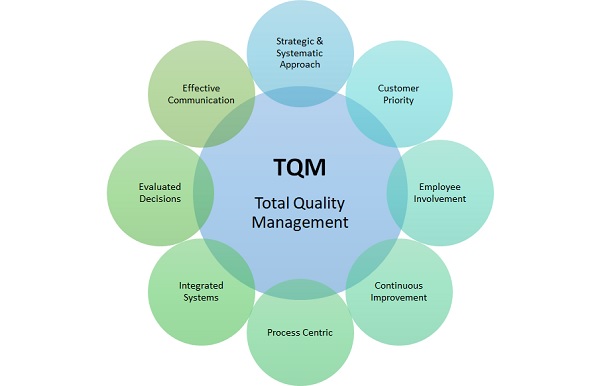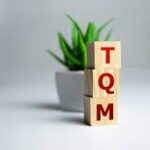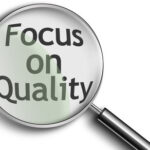The primary focus of this study was to understand the impact of TQM principles on library management. Hence, seven components of TQM were identified after extensive review of literature. The seven identified components were: Leadership, policy and strategy, training and development, staff management, teamwork, resources and processes. These components of TQM are fundamental to the basic principles of TQM, propounded by the quality gurus and available in all established TQM literature
Leadership
According to Deming’s 14 points, 7th point says, “Adopt and institute leadership”. On this basis, first component is considered as Leadership. The presence of leadership quality in the librarian would go long way to drive out the fear of change that the employers may perceive in Total Quality Management effort. The challenge is to build a management team that possesses such characteristics. The two intellectual capabilities that is essential to the leader is ability to perform abstract thinking; to move from concrete experience to a set of generalized ideas; and back to concrete experience again in ways that change the way the people think about the problem or an opportunity. The leadership of an organization must be committed to continuous improvement. This commitment must be visible throughout all layers of management. Management must “walk the talk” (Heinbuch, 1993).
The leaders must possess a vision and share the vision with everyone. Since the success of library depends upon the leadership ability of librarian to lead the team and take into confidence and work in team support in achieving customers satisfaction in the light of the objectives of the college. Efforts have been made to identify the leadership quality of the librarian in achieving Total Quality Management in management college libraries. Leadership is a work-in-progress and is a practical step in a journey to change organizational culture and build individual and organizational leadership capacity (Williamson, 2009).
Policy and Strategy
All the services provided by the library should come under the scrutiny of Total Quality Management. The coupling of policy and Total Quality Management services as a measure in assuring the entire library will be involved in strategic quality management programmes. Libraries and information services are not static entities impervious to outside influences but are dynamic and may be affected by one, or a number of factors. The total commitment to the strategic quality management has to be embedded in the management college libraries vision statement and policy and strategy of the libraries will re-enforce the commitment and clear goals before the library personnel, for which they exist.
The policy and strategy designed by the library should be made aware to the library users about the library objectives and services. The customer services and satisfaction lie at the heart of the service quality and therefore the library managers should focus upon the problem definitions. Policy and strategy of the management college library reflects the libraries vision statement, mission, goals and objectives and also services. Total quality management as a tool that can help in achieving the objectives of educational institutes in such a competitive modern global economy (Ahmed, 2012).
Training and Development
One of the essential ingredients of quality program is an extensive amount of training to the library staff. By training and development, the full potentials of library personnel can be achieved to improve the efficiency and development of the library. By creating an awareness of training opportunities, the organization demonstrates its commitment to a continuous improvement of employee’s skills.
The training programme will enable the staff to become familiar with the techniques such as latest development in their field. Thus, the training and development will eliminate waste and effecting continuous improvement. The training, development and education of employees at all levels within organizations is now considered a vital component in maintaining competitiveness in the international arena. It is also of some significance within the human resource management (HRM) and development (HRD) literature (Garavan, 1997).
Staff Management
Deming’s model of profound knowledge emphasizes need to understand the human psychology, which is not an easy task. The library staff are the primary resource of the library, whatever the quality of collection, databases, services and building may be, but the effective organization, maintenance, motivation and empowerment of the library staff are the most crucial factors that can make the name of the institution. It is certainly true that, as long as there is an understandable human desire for development exists between the library managers and its staff achieving total quality management in library is not an impediment rather it is a simple task. The managers needs to develop an attitude of awarding their staff for better performance, which will boost the morale of staff in achieving Total Quality Management in Libraries (Stuart, 2007).
The effective cooperation and co-ordination among library staff and the librarian is a basic necessity for achieving quality goals in the library. The form of recognition should fit the accomplishment; in other words, the value of the recognition should be commensurate with the value of the accomplishment (Porter and Parker, 1993).
Team Work
Working in teams is one of the current popular management techniques and it is becoming increasingly common for academic librarians to work with others on campus to solve problems, deliver services, develop information resources, create facilities and formulate policies. Collaborative teams of librarians and computing professionals have created campus websites, offered workshops for staff and users, planned labs and instructional technology centers and developed joint service desks. Teams of faculty, librarians, instructional technologists and others have created network-based learning experiences incorporating electronic information resources as an integral aspect of the curriculum. Faculty, student, librarian, and technologist teams have developed publishing projects such as electronic journals, electronic dissertations and databases. Teams of librarians, technologists and assessment experts are working to establish measures of the use and value of technology and electronic information resources on campuses. Graham (2003) says “it was tough he says the teams are very good about giving new workers safety guidelines and saying, look, if you are ever in doubt, make sure that you come and ask.
Resources
An approach to re-thinking the functions and objectives of the management college library is to start from a zero-base, this approach will identify what the college library aims to do and how to do then calculate, what information resources are needed to serve the institution, objectives effectively. The budget projects the amount of financial support required for personnel, equipment and suppliers needed to carry out the show of the library. The facilities like library books, building, furniture, equipment should be properly maintained in good condition (Schmiedel, 2007).
Processes
The pursuit of quality must become the primary motivation in the organizational process. The wide range of library activities and services aimed at collecting, organizing, maintaining and delivering information services and products. As a leader of the library, the library manager must identify the key processes of the library activities by breaking the processes in small activities. Each key processes of the library are assigned with library staff based upon type of work involved and competencies and skill required for the work. If however, the work process by which service was delivered is examined, there is an opportunity to say confidently that services was delivered is examined, there is an opportunity to say confidently that services were improved. With the emergence of computers and communication technology on one hand and complex needs of user community, there is a need to improve the work processes of the library on the basis of principle that nothing is constant and change for betterment is the ultimate. The library manager should authorize their library staff to identify the key processes of the library and assist for improvement in the execution of the work processes Cordes (2007).


